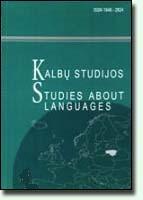Antrosios studijų pakopos (magistro) vertimo programa ir vertėjų įsidarbinimo galimybės: dviejų Palestinos universitetų atvejis
Post-graduate Translation Curriculum and Employability: The Case of Two Palestinian Universities
Author(s): Mohammad Ahmad Thawabteh, Ekrema ShehabSubject(s): Higher Education , State/Government and Education, Translation Studies, Human Resources in Economy
Published by: Kauno Technologijos Universitetas
Keywords: curriculum; employability; training; translator; Palestinian universities; postgraduate programmes;
Summary/Abstract: Translator training has made a significant contribution to translation in the job market world-wide. The issue of curriculum development has always been part of such training which can pave the way for employability. This issue should then be given due attention in view of recent developments in the field of translation and technology, and the considerably larger and more robust job market. This article aims to explore the status of professionally-oriented translation, curriculum-wise in Palestine as illustrated in two Palestinian universities offering MA in translation in the hope of giving some advice to developers of academic postgraduate translation programmes. First, the article closely examines the course description of the courses (core or elective) in the two universities. The article then shows that although most of the courses offered help graduates manage to get jobs or moonlight, the curricula seem to fail to match the employability in the growing market place, as some courses at these universities, with a varying degree, are unrelated to the local job market. The article concludes that (1) the issue of curriculum permanent planning and design in the light of the job market becomes vital in translation, or training and education; (2) developing a curriculum should be responsive to local, regional and international translation industry demands, and thus it might contribute to sustainable development in the Palestine translation industry; and (3) information technology-based courses should be given more attention and developed so as to keep abreast of today’s rapidly technological developments, since these courses might qualify graduates to cross various geographical borders to compete globally with peer translators.
Journal: Kalbų Studijos
- Issue Year: 2017
- Issue No: 30
- Page Range: 29-41
- Page Count: 13
- Language: English

